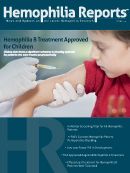Inhibitor Screening Vital for All Hemophilic Patients
Inhibitor screening is important for all hemophilia patients, not just those at high risk, according to a study by the CDC.

The importance of screening for inhibitors is stressed from the results of a hemophilia A and B patient study, published in Haemophilia.
Researchers from the Centers for Disease Control and Prevention (CDC) in Atlanta, Georgia enrolled 1,163 patients aged 2 months to 84.4 years from 17 federally funded hemophilia treatment centers (HTCs) across the country between January 2006 and June 2012. The researchers conducted this study in order to determine which patients were at the highest risk for inhibitor development. The investigators identified 3,048 inhibitor test performed which identified 23 new factor VIII inhibitors, of which 61 percent were not clinically apparent. Exposure days for all patients totaled 113,205.
After genotyping was analyzed, 431 distinct mutations were observed to cause hemophilia, of which 151 had not been previously reported elsewhere in the world.
Testing was done via blood samples that were shipped on cold packs or frozen. Hemophilia A patient testing showed that in 228 frozen samples, 126 (55 percent) had measurable FVIII activity. All of these patients were reported to have been treated with FVIII-containing products within 72 hours of blood collection. The researchers then introduced a heating step to eliminate residual FVIII. No hemophilia B patient (out of 160 factor IX tests performed) demonstrated an inhibitor titer >0.2 Nijmegen-Bethesda units (NBU). The researchers used a positive CDC test result for factor IX set at ≥0.3 NBU.
Inhibitor titer was detected in hemophilia A patients either at enrollment or during follow-up. Nine patients with inhibitor titers detected at enrollment had no overt clinical signs or symptoms, 89 percent had more than 20 days of lifetime exposure to concentrates, and 44 percent were over the age of 5 years. No newly elevated inhibitor titers were detected in hemophilia B patients.
The researchers note the occurrence of inhibitors in the American hemophilia population is not known due to anecdotal evidence and the fact that not all suppliers routinely test for inhibitors. They suggest data should identify target populations to track trends over time and identify inhibitor “outbreaks.”
“This study provided critical information about the practical issues that must be addressed to successfully implement national inhibitor surveillance,” the authors conclude. “Centralized testing with routine monitoring and confirmation of locally identified inhibitors will provide valid and representative data with which to evaluate inhibitor incidence and prevalence, monitor trends in occurrence rates, and identify potential inhibitor outbreaks associated with products.”
The investigators believe that with early identification through routine, regular inhibitor screening, the adverse event that hematologists expect may be decreased with the increase of successes in inhibitor treatment. This would therefore lower the cost and morbidity associated with inhibitor development in hemophilia patients. They believe if they had limited the study to high-risk patients, they would have missed a majority of the new cases: a third had non-severe disease and a quarter had greater than 150 exposure days. They cite this reason as the hopeful catalyst in more regular in-depth monitoring of inhibitors.
